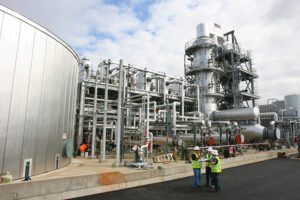WASHINGTON, DC – Today, nine trade associations representing feedstock providers, advanced biofuel producers, and low-carbon fuel customers wrote to EPA Administrator Michael Regan, urging the agency to propose and finalize robust 2026 Renewable Fuel Standard volumes by this November’s statutory deadline. The letter highlights the dramatic drop in the value of RFS compliance credits (or RINs) in response to EPA’s unreasonably low 2023 -2025 volumes EPA set last year. The situation prompted several production facilities to close and now threatens investments in feedstock processing capacity as well as production of sustainable aviation fuel, according to the association letter.
“Each of our industries are committed to reducing greenhouse gas emissions, and we recognize that sustainable biofuels offer some of the most substantial immediate benefits to deliver carbon reductions. The EPA should utilize the RFS to improve energy security, bolster domestic industry and manufacturing, and maintain America’s leadership in developing and using sustainable, clean transportation technologies,” the associations write. “While our industries will continue to make investments in producing, distributing, and using low-carbon fuels, EPA can and should send a strong signal to the market through robust RVOs.”
“Transportation industries are looking for low-carbon solutions – particularly for heavy-duty engines – and clean fuels producers and feedstock suppliers are coordinating to deliver those solutions,” added Kurt Kovarik, Vice President of Federal Affairs with Clean Fuels. “We are united in asking EPA to use the Renewable Fuel Standard to drive growth in the market, achieve significant near-term greenhouse gas emission reductions, and support the investments we’ve made. EPA must act in a timely manner on the 2026 RFS volumes to keep the program on track.”
“The U.S. oilseed industry continues to meet food, feed and fuel demand and stands ready to meet higher RVOs for 2026 and beyond. March was the largest monthly crush ever reported, up 11 million bushels year over year. National Oilseed Processors Association members have made over $6 billion in investments to increase crush capacity by nearly 30 percent,” said Kailee Tkacz Buller, president and CEO of NOPA. “This growth trajectory will be put in doubt risking billions in investments without certainty, clarity, and aligning RVOs to actual industry capacity from the EPA.”
Joining Clean Fuels in sending the letter are American Short Line and Regional Railroad Association, American Soybean Association, American Trucking Associations, Association of American Railroads, National Energy & Fuels Institute, National Oilseed Processors Association, North American Renderers Association, and U.S. Canola Association.
Read the letter on cleanfuels.org.
Contact: Paul Winters, 202-737-8803, pwinters@cleanfuels.org
ABOUT CLEAN FUELS ALLIANCE AMERICA
Made from an increasingly diverse mix of resources such as recycled cooking oil, soybean oil, and animal fats, the clean fuels industry is a proven, integral part of America’s clean energy future. Clean Fuels Alliance America is the U.S. trade association representing the entire biodiesel, renewable diesel and sustainable aviation fuel supply chain, including producers, feedstock suppliers and fuel distributors. Clean Fuels receives funding from a broad mix of private companies and associations, including the United Soybean Board and state checkoff organizations.





